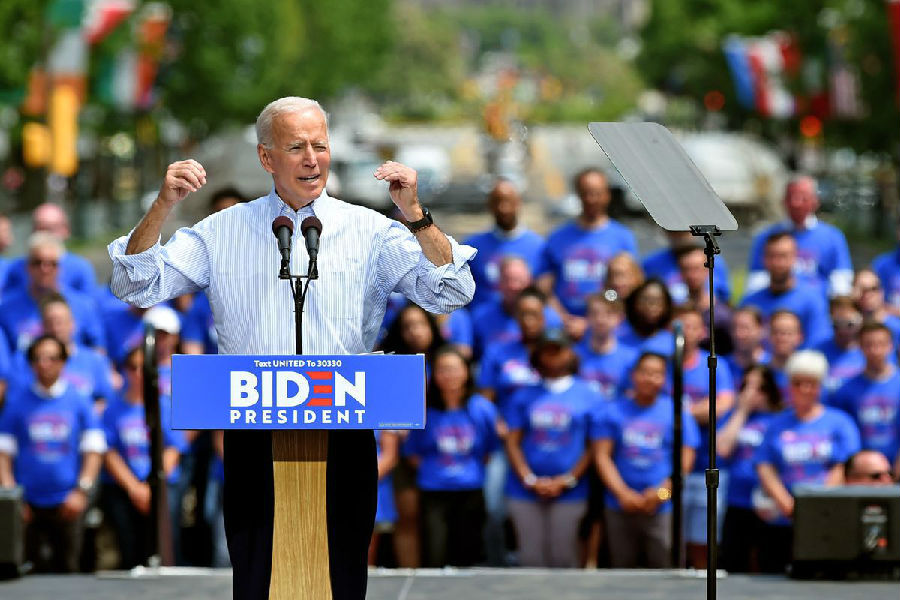Hari Sreenivasan: For more on how the political landscape is changing, NewsHour political reporter Dan Bush joins us now. This is unlike campaigns we've seen in the past. This is kind of the time we're especially heading into the month or two before the party conventions. It's full steam ahead. The leaders are really, we're down to two people, but they're not having any events.
Dan Bush: That's right. This is unusual and nothing like we've seen in recent memory. As you said, this is the moment where there are more rallies. They're trying to reach as many voters as they can in person. And yet here we are. We saw Senator Sanders and former Vice President Biden start canceling their events last week. They're pulling back. And these campaigns are big operations, Hari. It's like a company. Staffers are working from home in many cases now. So they're trying to, number one, reduce the exposure. Obviously, sort of reduce the number of large crowd gatherings and the number two, find creative ways to reach voters virtually.
Hari Sreenivasan: So what does that virtual town hall campaign rally look like?
Dan Bush: So we're starting to see that in the last week. Biden had his virtual town hall, essentially sort of like imagine a large teleconference with a lot of people where Biden can speak even though he's not in the room. That was in Illinois. We saw Sanders do a kind of online fireside chat. And even ahead of the debate tonight, the Sanders campaign announced today that they're doing a sort of live stream where they're sitting down with campaign officials and some experts to talk about the Coronavirus, to talk about the campaign. So they're trying to find ways to reach people, even when the candidates themselves can't be out there talking to voters, doing all of the sort of general election year things we're used to seeing.

Hari Sreenivasan: I should also mention the Trump campaign has canceled some of its events as well. So when you look at all three of these gentlemen, if they are the presumptive leaders of their parties and possibly could be competing to be president, they are smack dab in the, in the demographic that is at greatest risk, right? They are officially the elderly.
Dan Bush: That's right. That's right. And we saw President Trump just announced yesterday that he had been, the White House released this, that he had been tested for coronavirus. That test came back negative. We're waiting to see sort of how Bernie Sanders and Joe Biden approach that. But you're exactly right. And that's another reason why the campaigns, in addition to sort of following the guidelines, for example, Joe Biden in canceling his election night in-person rally on the second Super Tuesday, just this past Tuesday, he cited official state guidelines. This was in Ohio saying, reducing sort of large crowds, large gatherings. But also these candidates are out there, you know, at a given rally shaking hundreds of hands, right? Taking the selfies that we see so much. And that's another reason why these campaigns are saying, wait a minute, let's slow this down. We do have to sort of adjust to this new reality.
Hari Sreenivasan: And does the lack of in-person campaigns give either Joe Biden or Bernie Sanders any kind of an edge, whether it's based on their kind of online infrastructure or who gets more from this stuff?
Dan Bush: Such a good question. And, you know, sort of a double edged sword. On the one hand, Bernie Sanders has built a following going all the back in 2016 with these large rallies, with these large events where sort of his supporters can can get energized, where the media sees that, where Sanders gets attention. That's one of the strengths of his campaign. It does hurt him, especially this point where he's behind in the delegate count, where he's trying to regain momentum. Not being able to be out there is difficult for Sanders. On the other hand, we are seeing him sort of breakout his full arsenal of digital tools. He has a robust organizing effort online. So he is well positioned to sort of take advantage of this virtual moment, if you will, to reach out to voters that way. Biden, on the other hand, has struggled a little bit more to adjust to this, this reality of campaigning in 2020. He's catching up quickly, though, and he actually depends a little bit less on those large crowds, usually does smaller events. So arguably, Biden is actually slightly better positioned sort of as they deal with this with his moment in the campaign.
Hari Sreenivasan: All right. NewsHour politics reporter Dan Bush.Thanks so much for joining us.
Dan Bush: Thank you.













